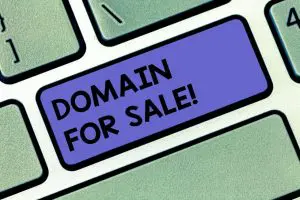Key takeaways:
- When domains expire, all services associated with that domain will cease to function.
- Domain names enter a grace period (typically 1–45 days after expiration date) and a redemption period (30–45 days after grace period) after they expire.
- Domain names expire to ensure fairness and accessibility for everyone.
A common issue that most startup businesses face is finding out that their website is inaccessible or their domain name no longer works, and they’re caught off guard. But why does this happen?
In this article, we’ll go through everything you need to know about domain name expirations, why domains expire, what happens when a domain expires, and how to prevent your domain from expiring.
What happens when my domain expires?
When a domain name registration expires, any services associated with that domain, like websites or emails, will go offline. For the domain owner, you won’t be able to make changes or updates to it.
A domain expiration doesn’t instantly mean it’s gone for good; it simply means the current registrant is no longer actively maintaining or renewing it.
Domain expiration timeline: What happens after your domain expires?
When a domain name expires, it goes through three different stages:
- Grace period
- Redemption period
- Auction and release
To better understand the domain’s expiration, let’s break each stage down.
Grace period (Typically 1–45 days)
Your domain expires the day after its expiration date. That means your email stops working and your website switches to a parked page, which lets visitors know the domain has expired. During this phase, you can usually renew your domain at a standard price without extra fees.
Important: In as early as 30 days after expiration, your domain may be purchased by a third party. Once this happens, you won’t be able to renew or redeem it anymore.
Redemption period (Typically 30–45 days after grace period)
If you fail to renew your domain during the Grace Period, it enters the Redemption Period. During this phase, you can still redeem your domain name for its standard renewal price, but with an additional redemption fee.
Auction and release
Once the domain name is in ‘pending delete’ status, you cannot redeem it anymore. The registrar holds the domain for five days and releases it to the public for registration.
Note: This process applies only to TLDs governed by the Internet Corporation for Assigned Names and Numbers (ICANN) . Non-ICANN TLDs, like country code top-level domains (ccTLDs), might have their own domain expiration process.
When do domain names expire?
Domain names expire after their registration period ends, which is between one to ten years. They’re usually marked as expired at midnight the day before the expiration date, and no further action occurs.
In most cases, the domain registrar notifies the domain owner or registrant before the expiration date. They send multiple reminders through email or notifications in your account days or weeks in advance. These alerts will give you enough time to renew your domain.
Why do domain names expire?
You can’t own a domain forever, and there are a few reasons why a domain name expires, such as:
- ICANN regulations
- Missed renewal reminder notices
- Disabled auto-renewal
- Outdated billing information
ICANN regulations
One reason why domain names expire is to prevent hoarding.
ICANN is an international body that oversees domain name regulations. It sets out rules for how registrars manage domain names, who can register a domain name, and the domain expiration process.
ICANN helps ensure that no one can buy a domain to keep it off-limits forever. The bottom line is that domains expire to promote fairness and keep domain names accessible to everyone.
Missed renewal reminder notices
Auto emails and notifications may clutter your inbox, but they can be lifesaving. So, if you have switched off renewal reminder notices, you might be setting yourself up for disaster. Thirty days before the domain expires, your registrar will send you reminders through your listed email address. So, pay attention to your inbox to ensure you don’t miss these important reminders.
Disabled auto-renewal
Go through your account information and switch on the auto-renewal setting. It automatically renews your domain name before the expiration date to prevent disruptions to your website.
Outdated billing information
When you lose a credit card or it expires, you may forget the sites and services that auto-bill it. In such cases, the last thing on your mind will be to update the billing information on a domain you rented years ago. This can lead to a failed domain name renewal even if you have set it to auto-renew.
Registrar issues
It’s very rare, but sometimes domain names expire because the registrar is going through a technical error. Sometimes, policy changes in the registrar might cause some domains to expire or no longer function.
Domain holds or locks
This doesn’t necessarily mean expiration, but sometimes, a domain will lose its function when it’s put on hold. Common reasons a domain is put on hold are legal disputes or policy violations.
How to protect your domain from expiring
There are a few simple ways to keep your domain from expiring unexpectedly and ensure it stays in your hands.
- Get Domain Expiration Protection. This domain add-on feature guarantees another full-year domain ownership, automatically renewing your domain even if your card fails.
- Enable auto-renewal. By turning on auto-renewal, you can ensure an automatic renewal before the domain’s expiration date.
- Check your email regularly. This ensures you don’t miss any domain renewal reminders. You’ll have enough time to prepare yourself and think about your domain renewal.
- Update your billing information. Outdated payment information and expired credit cards are common causes of missed renewals. Updating it ensures a smooth payment process.
- Use a domain expiry checker. Consider using tools like a domain expiry checker to track a domain’s status, mainly its expiration date.
- Consolidate your domains. Consider moving domains to one provider to ensure a streamlined domain management.
Protect your domain today with Network Solutions
A domain could fall out of your control for many reasons, but with the reminders above, you can avoid the stress of losing your domain name.
To ensure efficient domain management, choose Network Solutions. With features like Domain Expiration Protection, Domain Privacy + Protection and auto-renewal options, you can sleep well at night knowing your domain is in good hands.
Frequently asked questions
Yes, you can typically renew an expired domain name within the 45-day grace period. Once that period is complete, the domain enters a redemption phase, which can cost more because you’ll pay the registry to reinstate it. The redemption phase also includes a one-year renewal.
No, but you can try to register the same domain once again when it’s available to the public. Try to be alert and ensure no one takes it before you.
Many expired domains don’t immediately go public after their expiration date. Sometimes the registrar can put it up for auction, where expired domains are up for sale to the highest bidder before the deletion stage.
No, but a registrant can request to terminate its registration. This also depends on the registrar’s policies and the domain extension.
It’s good if the domain name has valuable backlinks and strong SEO records. However, it’s still an important step to research its past use to avoid any issues down the line.




